Beirut's famous waterfront and streets heaving with people fleeing Israeli air strikes
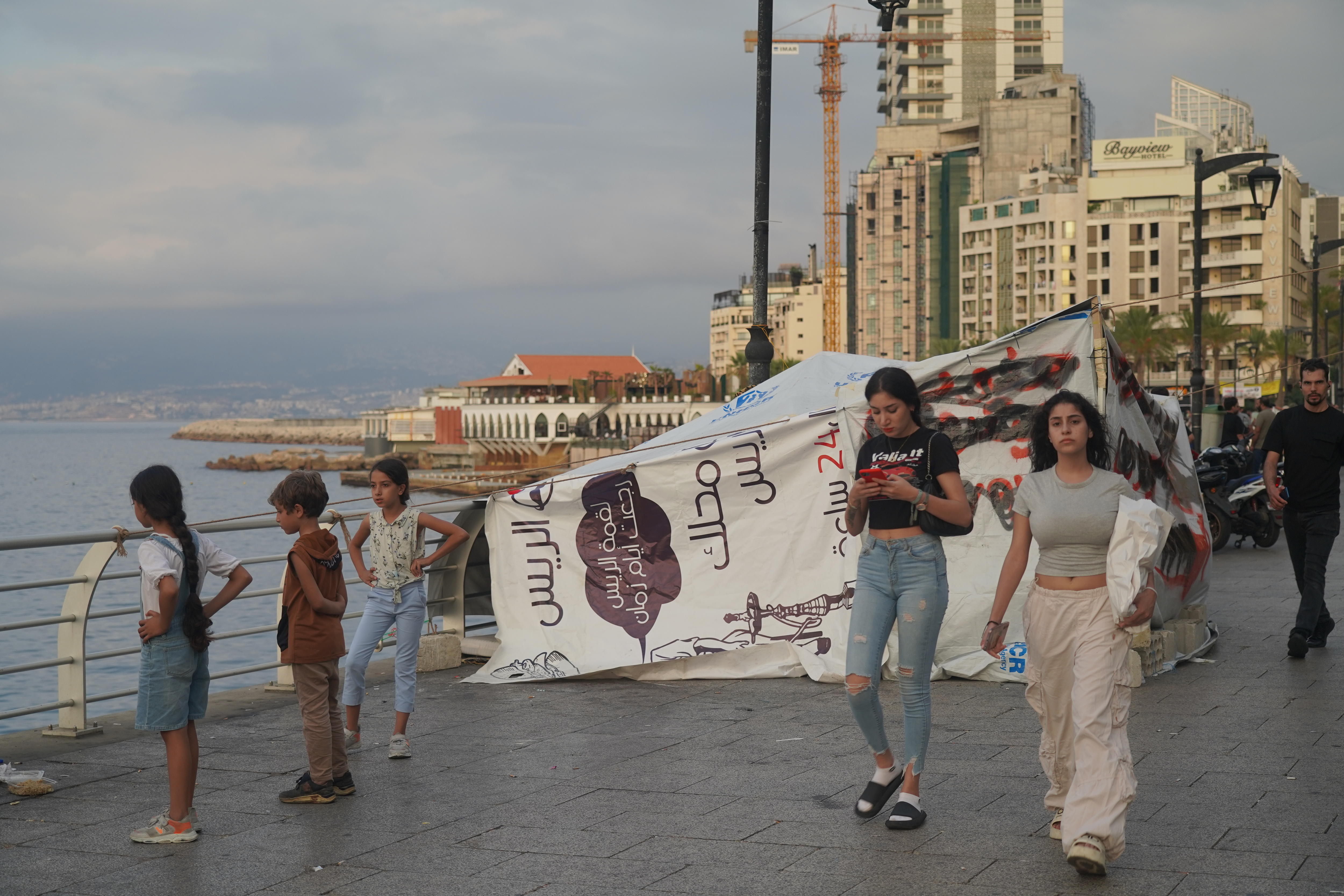
Beirut's famous Corniche waterfront strip is full of makeshift tents.
They sit forlornly on Beirut's famous waterfront, feeling hopeless and helpless.
Many have foam mattresses, bottles of water and little else.
Some have pitched tents, which sit incongruously on the footpath next to people fishing and socialising.
They are the newly displaced, most from Beirut's southern suburbs, sleeping rough to avoid air strikes, unable to find anywhere else to go.
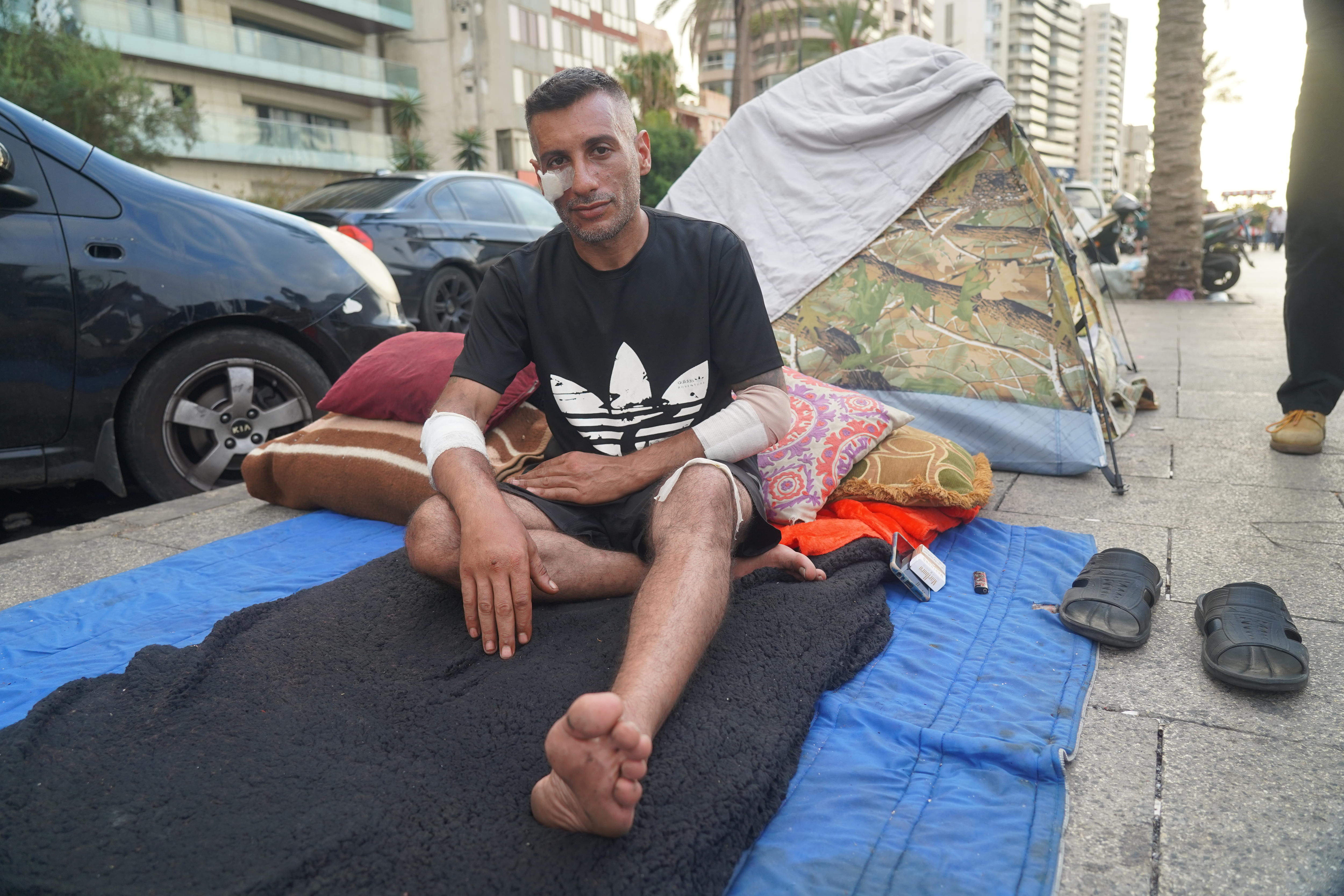
Hassan Sakr has been sleeping rough for 12 days.
Hassan Sakr is sleeping on a mattress on the concrete after leaving his home in Dahiyeh.
He has bandages on his face, arms and legs.
"I've been here for 12 days," he said.
"Around five days ago I went home to shower. When I was done, I was leaving through Haret Hreik [a neighbourhood the Israeli Air Force has struck repeatedly]. There was an Israeli strike and I was thrown from my motorcycle and injured."
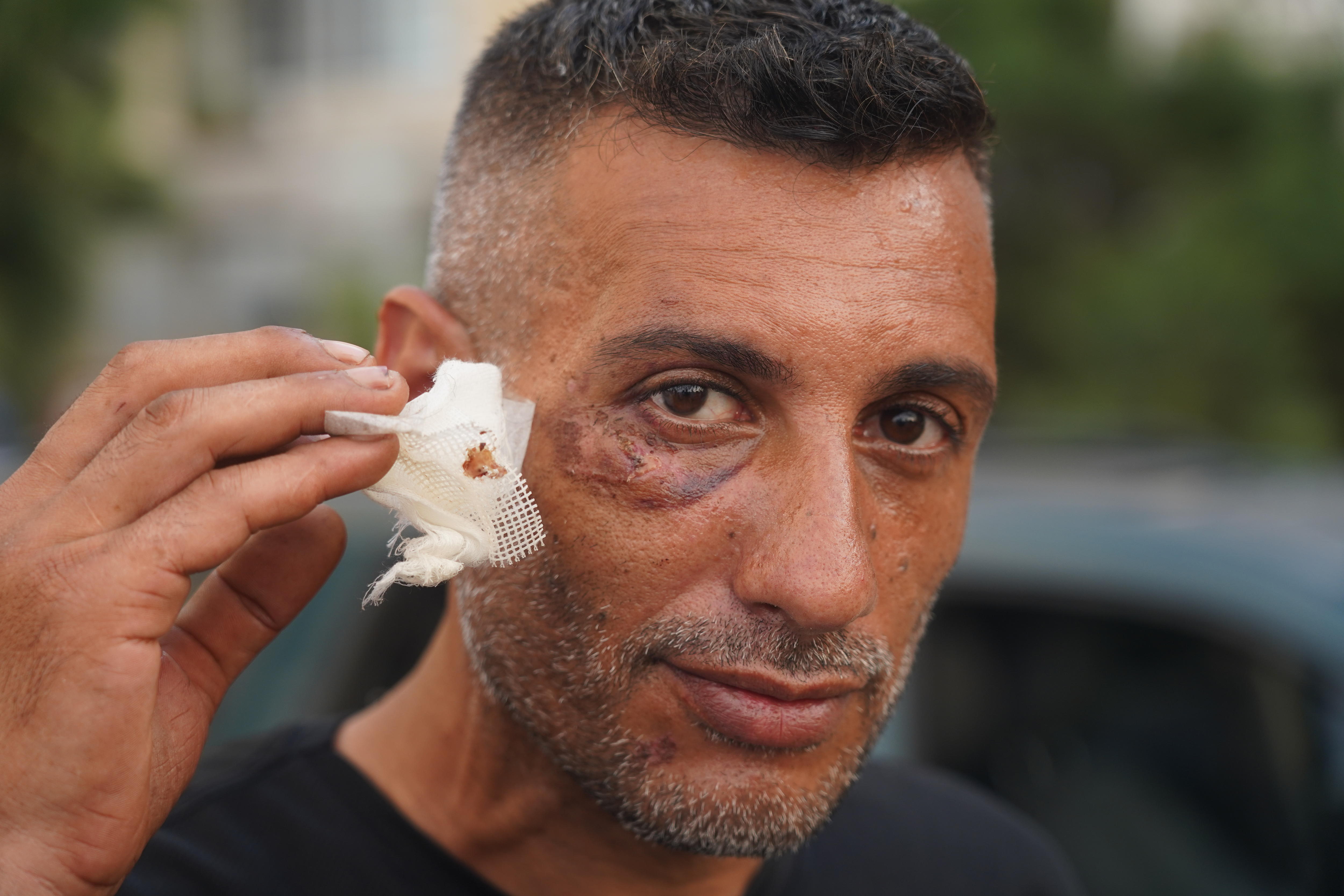
Hassan Sakr shows his injuries from an air strike that knocked him off motorbike in Haret Hreik.
'Lebanese people do not live like this'
The Lebanese government says 1.2 million people have been forced from their homes by Israel's bombardment and invasion, most in the past two weeks.
Many fill the public spaces around Beirut – footpaths, squares, churchyards, schools.
"Look at what happened to us because of the war. We don't have food to eat. Look how we are sleeping. Look at our situation. We don't have showers. It's impossible," said Rabih Ayyoub, who left Dahiyeh and is sleeping in downtown Beirut's Martyrs' Square.
"Look at me," he said, gesturing at his skin.
"We have nowhere to get clean. Lebanese people do not live like this."
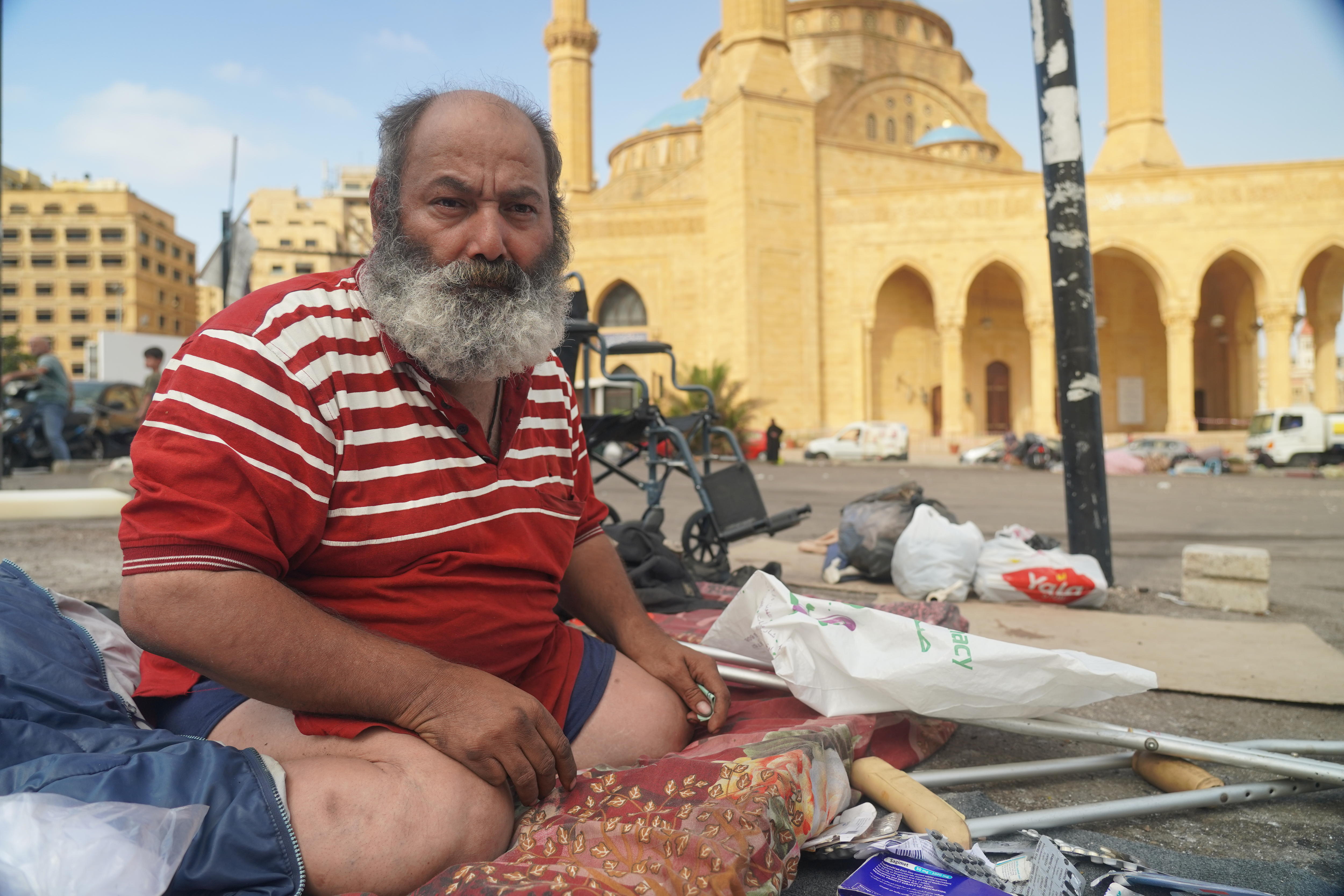
Rabih Ayyoub says many Lebanese people have been left without food and shelter.
Mother-of-three Awatef is a refugee from Syria who has been displaced again by the air strikes on south Beirut.
She is now sleeping on the Corniche, Beirut's waterfront strip, in front of fancy hotels and restaurants.
"I was displaced from Aleppo and I came to Lebanon, but these kind of monstrous acts, I have not seen before. My house in Syria is gone and now my house here is gone," she said.
"My house is just next to the airport. If we were in the house when the strikes happened, none of us would have survived.
"I feel pain inside that I can't describe. As you can see, we've been here since Friday. Soon it will rain. Where can we go? We just need shelter."
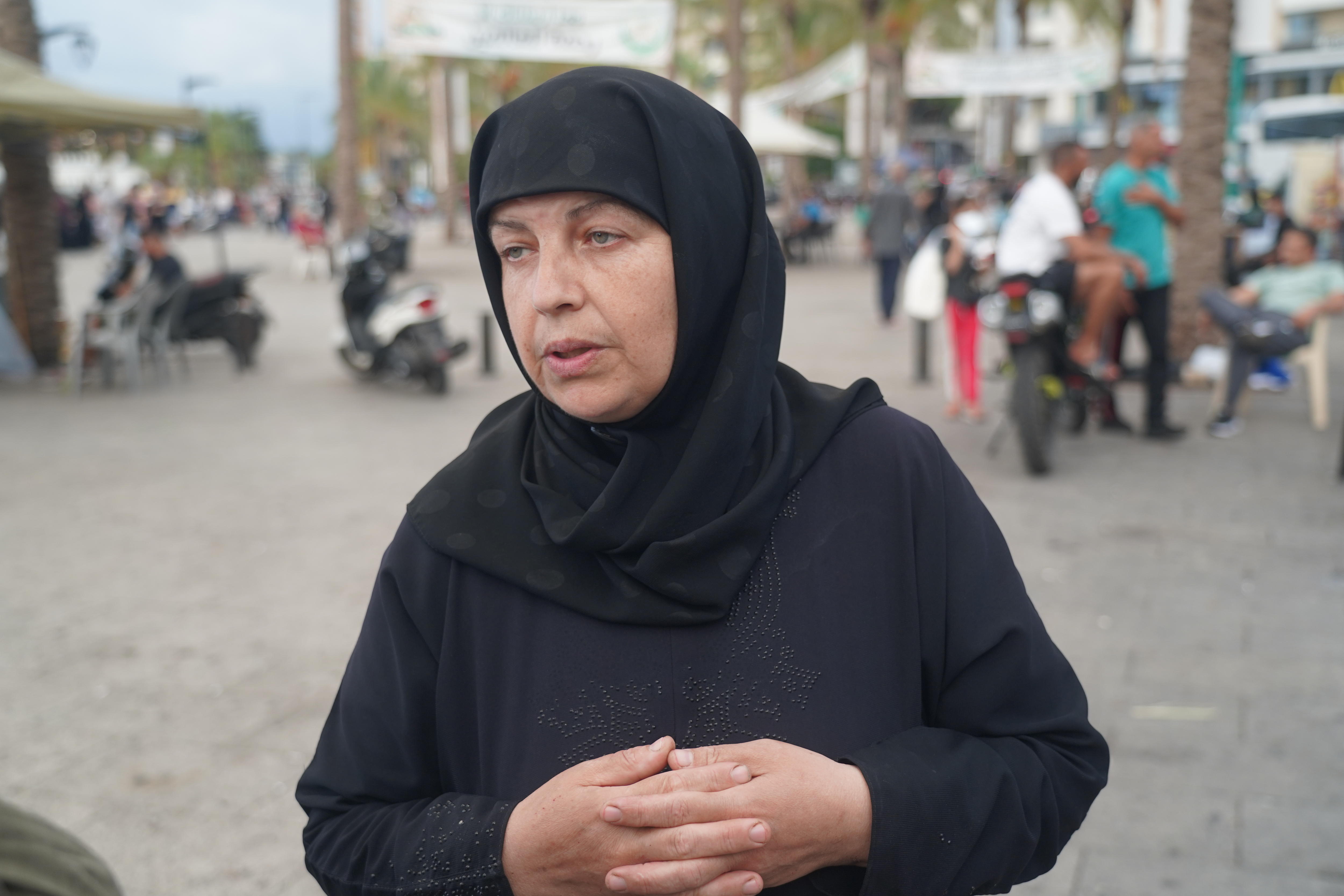
Syrian refugee Awatef has had to flee for a second time.
Civilians in the line of fire
Many of the displaced feel Israel has targeted civilians — something the Israel Defense Forces (IDF) denies — and is deliberately destroying their homes.
"This is the first time I have witnessed war in Lebanon. This is first time I have witnessed the monstrosity of Israel. May God eliminate Israel," Awatef said.
Kassem Ashour, who left his home in Chakra in southern Lebanon, said he saw air strikes kill civilians.
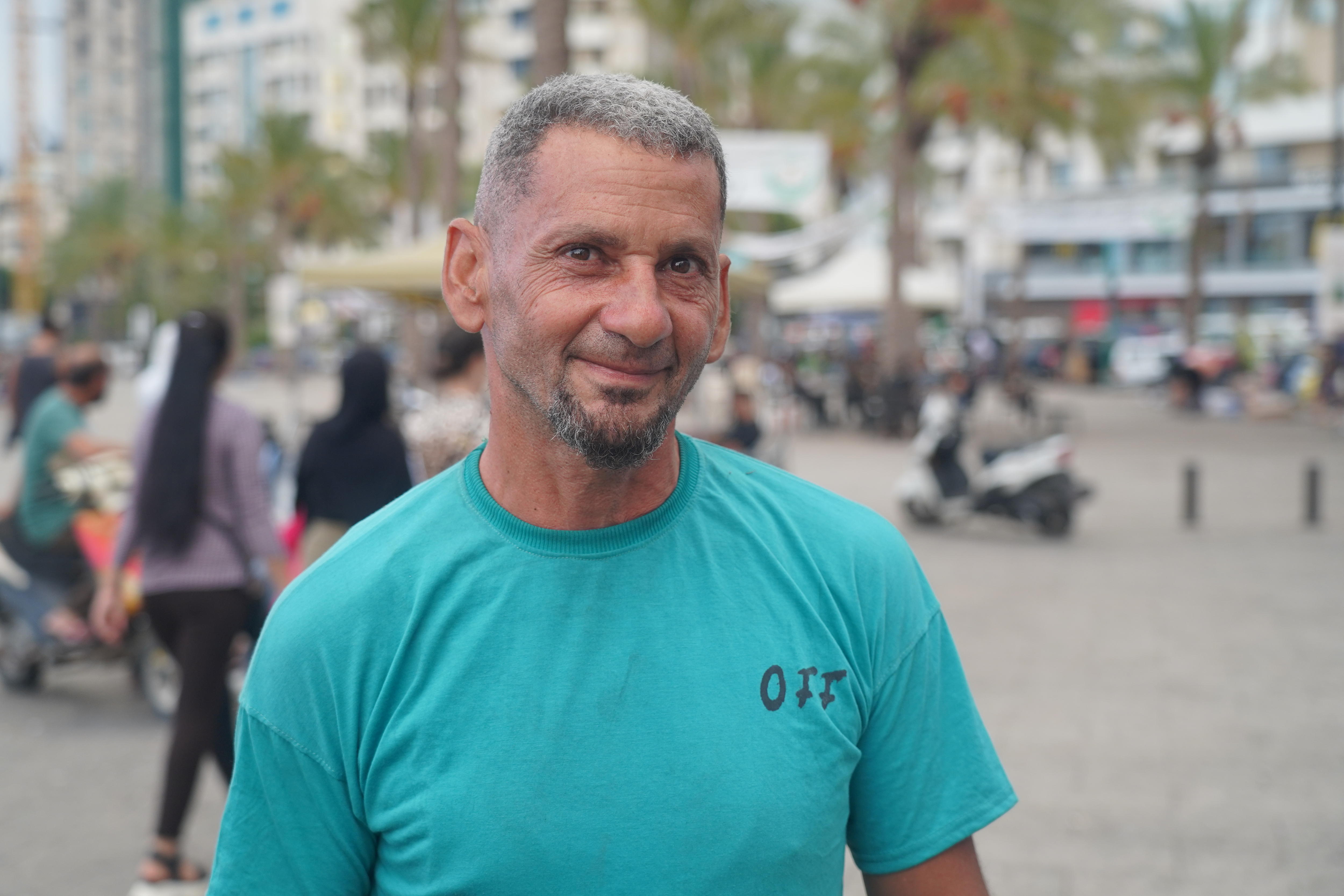
Kassem Ashour saw neighbours trapped under rubble.
"We got surprised that the Israeli airplanes are not striking the fighters who have weapons and missiles. The warplanes are doing massacres and slaughters," he said.
"Many massacres happened in front of me. My neighbours are under the rubble. I tried to rescue them and I couldn't. Both my legs were injured and I was forced to leave.
"Israel is a criminal state, it's not acting in self-defence. It is a state of injustice. Those who support human rights, please come and see what it's doing."
The Israeli military has said it is targeting infrastructure and officials from the Lebanese militant group Hezbollah, a listed terrorist organisation in Australia.
It has accused the group of building weapons production facilities and other infrastructure underneath residential buildings in southern Beirut and has been warning residents to leave.
"Hezbollah has deliberately embedded its terrorist infrastructure and weapons inside civilian areas, including homes, in Lebanon. The IDF is continuing to conduct precise operations in order to remove threats to Israeli civilians," the IDF said in a statement.
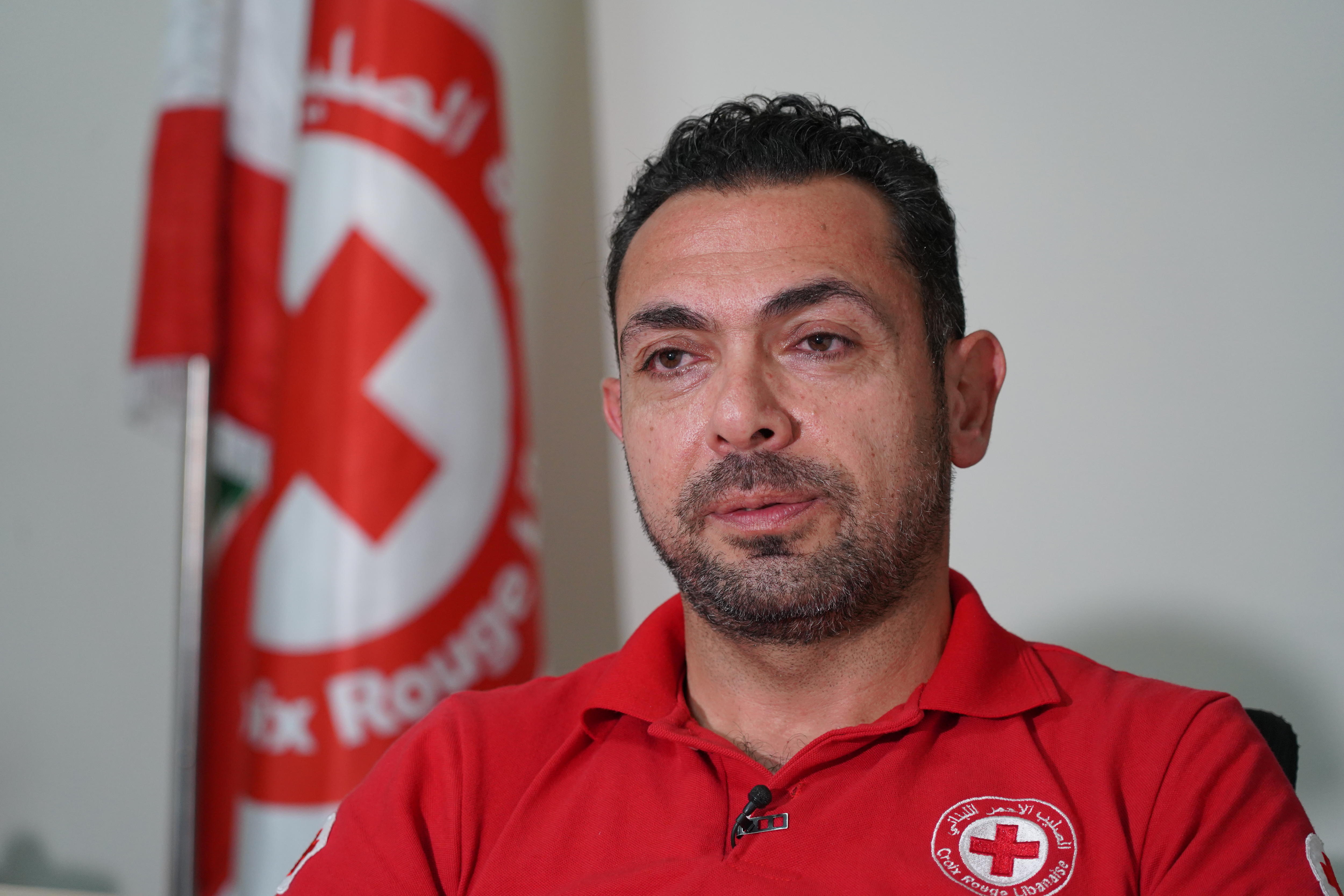
Director of the Lebanese Red Cross, Kassem Shaalan.
Aid groups can't keep up with demand
Lebanon has been in an economic crisis since late 2019, when the country's financial system collapsed and the COVID-19 pandemic and 2020 Beirut blast further destabilised the state.
It has a caretaker government and has been without a president since 2022.
The director of the Lebanese Red Cross, Kassem Shaalan, told the ABC it was impossible for humanitarian groups to provide aid to everyone affected by the conflict.
"When we used to have 100,000 displaced people, the capacity of the government and even the UN and NGOs was not able to respond to respond to the need of the community, and suddenly we went up – within less than four or five days – to a million [people displaced]. That, by itself, can explain that there are displaced people who, until today, are not receiving aid," he said.
"Aid is coming, but even the aid we are receiving today is not up to [the] speed that we need to support the displaced people."
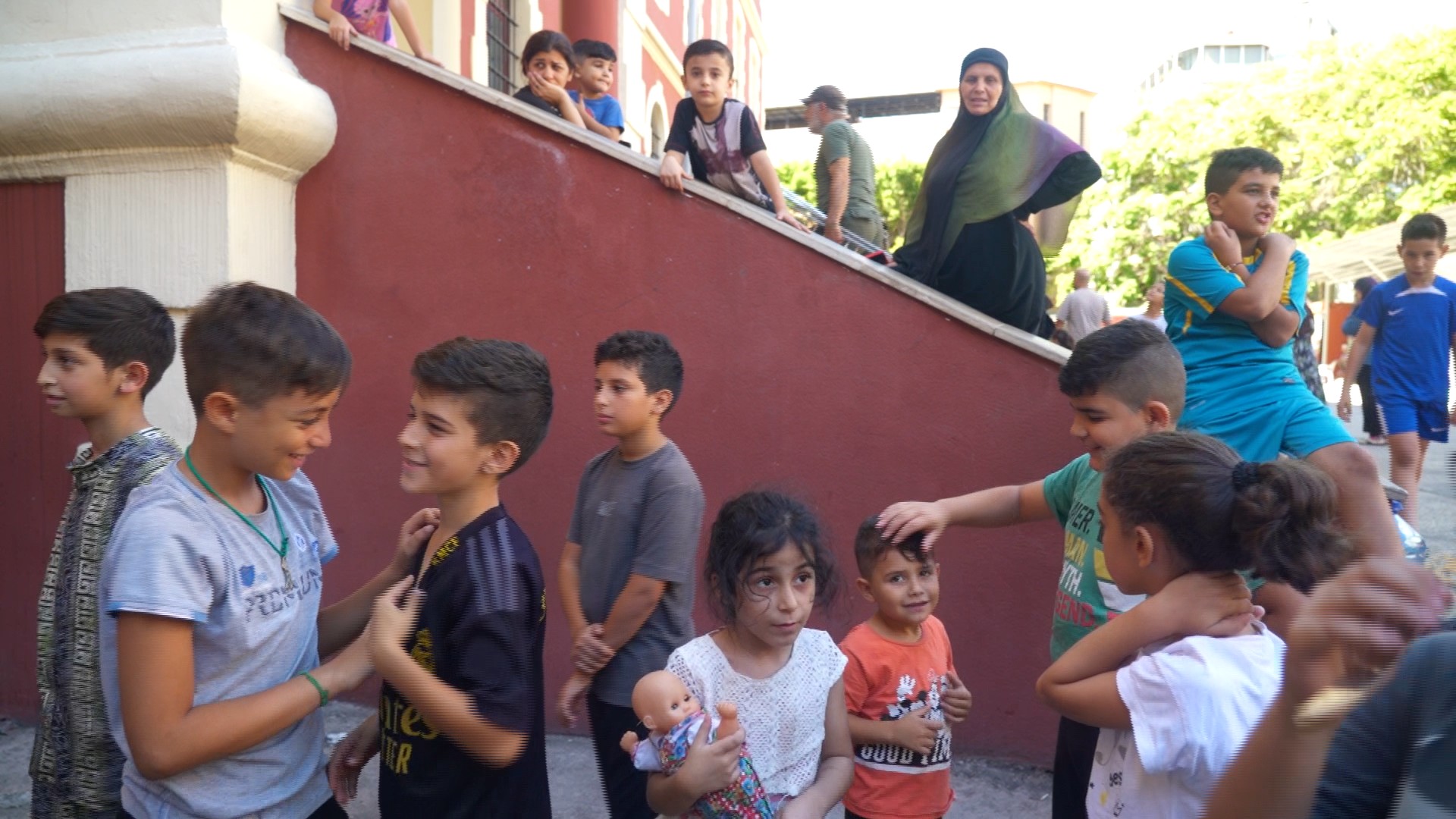
Displaced children at a school in west Beirut.
Schools become shelters
Many of Beirut's schools are now shelters for displaced Lebanese.
In one west Beirut school, 650 people from the Beqaa Valley and southern Lebanon have moved into the classrooms.
Most are women and children.
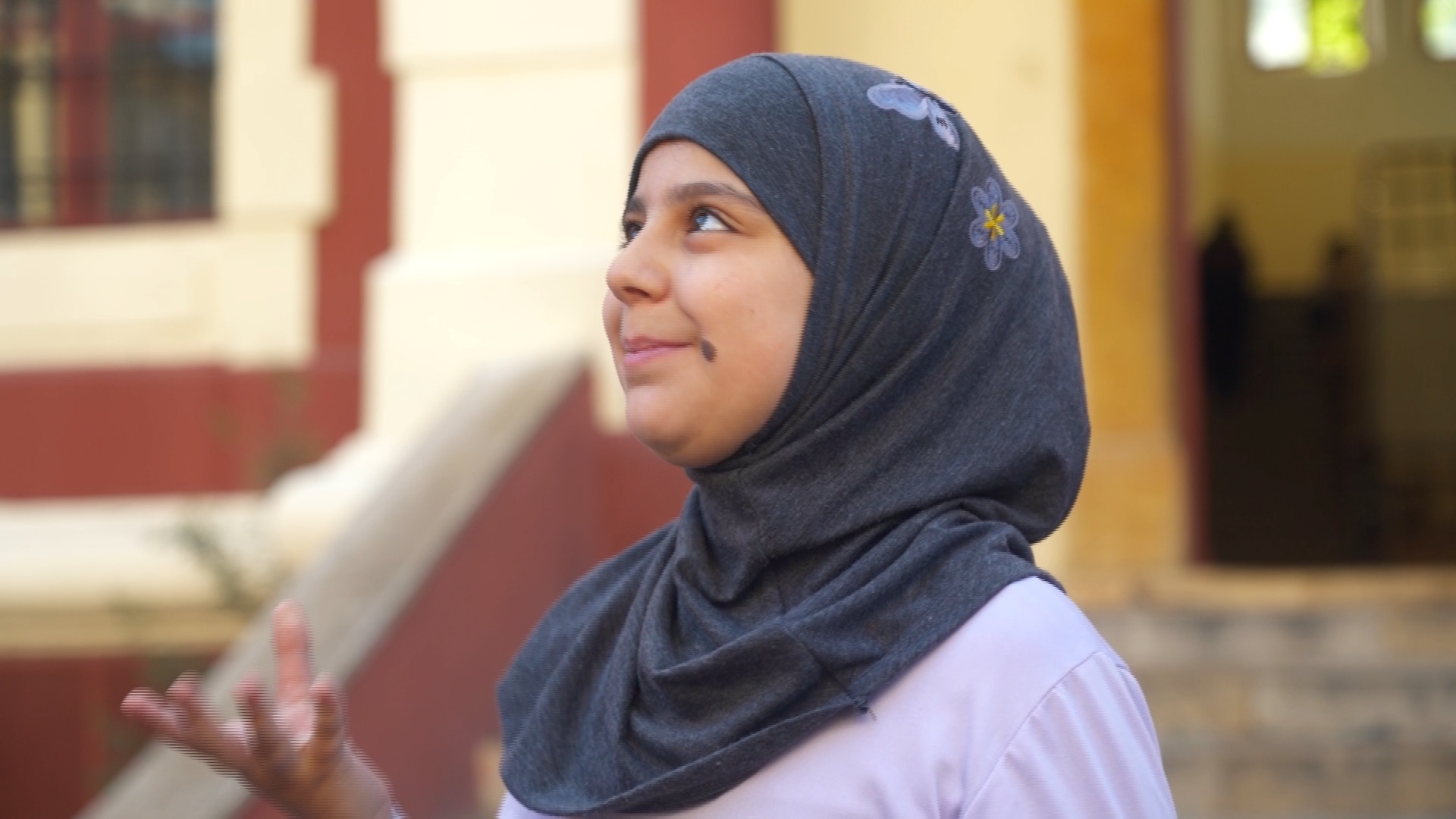
Lama Ali Brayteh has evacuated to a Beirut school.
"It's a very sad thing that we had to leave our land and our home because of the war, but of course we will be victorious, and even if our houses are destroyed, we will build them again and live there," 11-year-old Lama Ali Brayteh, from Baalbek, told the ABC.
Sabah, a 70-year-old grandmother from Ma'arakeh, near Tyre, said 35 people from her extended family were sheltering in the school.
"It's true that we have a problem with Israel but we never hurt babies or women or civilians. Israel is hurting the old and the young and the babies and the infants. It's not giving mercy to anyone," she said.
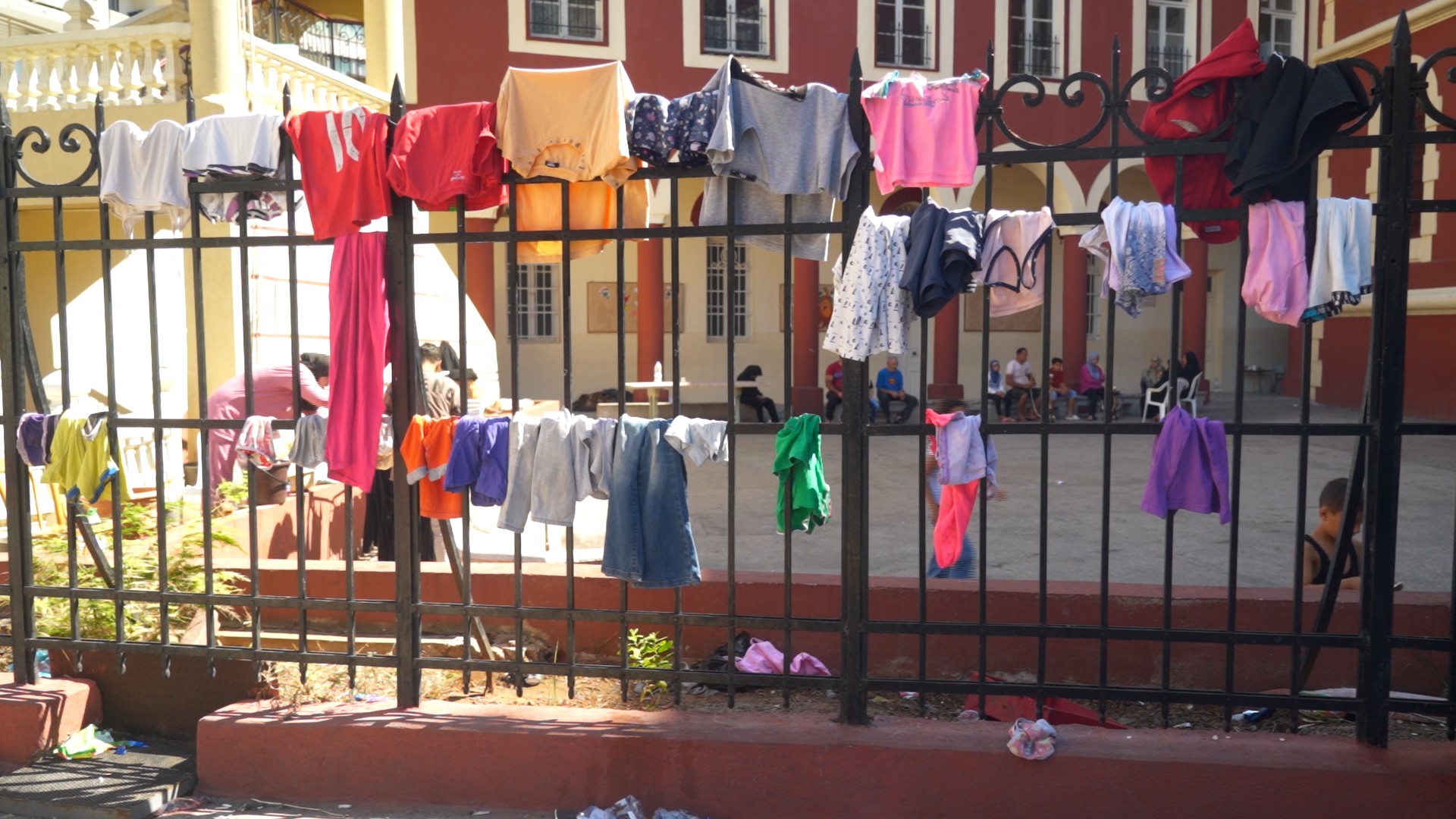
650 people from the Beqaa Valley and southern Lebanon are sheltering at a Beirut school.
"They didn't let us sleep at night and they made the children homeless. What did they do wrong? They killed my mother and my father and they made my brother and sister homeless."
"Would God accept this? Where is the morality? Where is the humanity? Why? What did we do? I didn't do anything."
By:https://www.abc.net.au/news/2024-10-09/lebanese-people-in-beirut-displaced-by-israeli-air-strikes/104442660(责任编辑:admin)
下一篇:Hezbollah drone attack kills four Israeli soldiers as IDF criticised for entering UN base in Lebanon
 Socceroos rescue a point
Socceroos rescue a point  Wallabies thrash Wales 52
Wallabies thrash Wales 52 Jake Paul beats Mike Tyso
Jake Paul beats Mike Tyso Live updates: England vs
Live updates: England vs  US election 2024: Donald
US election 2024: Donald 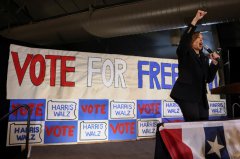 US election live: Kamala
US election live: Kamala
- ·North Korea's latest weapon agains
- ·Hezbollah says Israel 'cannot impo
- ·Inside the rise of US oligarchs and how
- ·Thailand's worst suspected serial
- ·Tabi shoes are turning heads from Holly
- ·FBI arrests Florida man planning attack
- ·Illegal immigrant gets life sentence fo
- ·Bibles, water, watches and sneakers: Do
- ·North Korea's latest weapon against
- ·Hezbollah says Israel 'cannot impose
- ·Inside the rise of US oligarchs and how i
- ·Thailand's worst suspected serial ki
- ·Tabi shoes are turning heads from Hollywo
- ·FBI arrests Florida man planning attack o
- ·Illegal immigrant gets life sentence for
- ·Bibles, water, watches and sneakers: Dona
- ·US to give Kyiv anti-personnel landmines
- ·An arrest warrant for Benjamin Netanyahu
- ·One of Vietnam's high-profile politi
- ·Shanghai Walmart Attack: A Man Randomly S
- ·South Korean police officers jailed over
- ·Cambodia publicly shames maid deported af
- ·North Korea to use all forces including n
- ·Philippines condemns China attack of Viet
- ·US adds 2 more Chinese companies to Uyghu
- ·North Korean defector steals South Korean
- ·Malaysia deports Cambodian worker for cal
- ·Rebels battle for Myanmar junta’s weste

